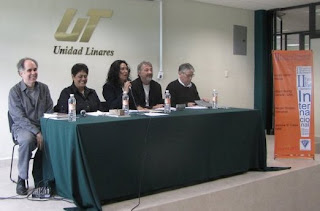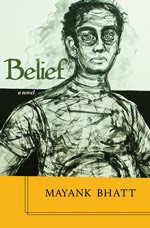 |
| Authors at the Linares International Literary Festival |
Saturday, March 26, 2011
Linares International Literary Festival (Linares, N.L., Mexico)
The 2nd edition of Linares International Festival was held between March 15 and 18, 2011. The town is located 127 kilometres from Monterrey in Mexico.
Colin Carberry, an Irish-Canadian author, founded the Linares International Literary Festival in 2010. He is the festival’s artistic director. Pilar Escudero and Silvia Hernandez of the Institutional Development Department of Colegio Linares, A. C., supported Colin in organising the event. The school’s director and board, and members of the local business, cultural and literary communities, supported them
The festival features art events and evening entertainment, such as poetry readings, panel discussions, lectures, book signings, music, art and photography exhibitions, a book fair, documentaries, literary dinners, and a ‘Café Literario’.
Created on the bicentenary of Mexico’s independence, the Literary Festival’s mandate is to promote reading, and to encourage interest in and to increase awareness of Mexican and international literature, history and culture.
By all accounts, the festival was a spectacular success:
US-Canadian poet Albert Moritz first plucked an orange from a tree
Indian-Canadian author Jasmine D'Costa felt like a rock star
Bosnian author Goran Simic proved that México is a country filled with warm and welcoming people
Slovenia's top poet Marjan Strohan was struck by the beauty of the architecture of the area, which he described as "European style, but with nicer people."
The town Mayor, Francisco Medina, congratulated the festival organisers for a fantastic and unprecedented job they have done in attracting writers of global significance to a town.
Colin believes the festival will grow in strength: "We have tapped into a rich vein of interest in literature here in Linares, and a deep hunger among the citizens of Linares to share their rich culture with the wider world. Deep down, I always knew this, and decided to take a gamble and organize a festival in 2010, thinking an honest failure was better than a false success. But the goodwill and support shown to me by the people of Linares have astounded me, and this year's festival has surpassed all my hopes and expectations. The Linares International Literary is now a first-class event that will only grow in stature, size, and prestige."
Saturday, March 19, 2011
South Asian-Canadian sensibility
A few days ago, I saw an exquisite documentary Carmel Ashram – A brief glimpse my friend Gavin Barrett posted on Facebook.
In his trademark self-deprecating manner Gavin describes what is a remarkably lyrical and poetic memoir as a “poorly produced account” of a journey he took in January to Jalpaiguri (on the foothills of Darjeeling) to meet his Aunt June, a poet and an advertising professional-turned cloistered nun at the Carmel ashram. (See the video here: Carmel Ashram – A Brief glimpse).
Eschewing hyperbole – which wouldn’t have been out-of-place and perhaps more natural, given that the narrator was meeting his aunt after decades – Gavin’s austere and simple narrative captures the austerity of the ashram, the simple and industrious life that the nuns lead.
The film’s appeal lies in its depiction of India that is rarely seen or acknowledged – an India that has been shining even when its GDP wasn’t galloping.
The subdued and sublime sensibility of a poet surfaces effortlessly and consistently throughout the short film, both in the images and the words that he chooses to tell his story; a sensibility that is clearly a confluence of the filmmaker’s Indian past and Canadian present.
Although, I’m not sure that is his identity.
I was reminded of MG Vassanji’s essay The Postcolonial Writer: Myth Maker and Folk Historian in A Meeting of Streams: South Asian Canadian Literature (Edited by MG Vassanji and published by TSAR Publications 1985).
(Edited by MG Vassanji and published by TSAR Publications 1985).
Vassanji explains, “...He (the writer) gives himself a history; he recreates the past, which exists only in memory and is otherwise obliterated, so fast has his world transformed... To borrow an image from physics, he creates a field space – of words, images, and landscapes – in which to work with, and install the present.”
South Asian and Indian sensibilities were among the many aspects of a discussion in which I participated a couple of weeks ago.
Travel writer and India tourism expert Mariellen Ward moderated an informal chat in which Jasmine D’Costa, Farzana Doctor, Niranjana Iyer and I shared our views with Mariellen on the rise of Indian writing in English in Canada.
The discussion was in the wake of the launch of Indian Voices 1 – an anthology of prose and poetry by Indians residing in 16 countries across the globe. The second largest number of writers in the volume – that will be released in Toronto next month – is from Canada.
Is there a South Asian or an Indian sensibility that is inherent and perceptible to writers who may be from different parts of the world but are of a South Asian or Indian descent?
In his Introduction to A Meeting of Streams: South Asian Canadian Literature, Vassanji says, “The term South Asian is a self-definition of the kind just introduced. It implies much. It refers to people who trace their ancestry to the Indian subcontinent. It includes, besides those who come to North America immediately from the countries of South Asia, the “East Indians” of the Caribbean and the “Asians” of East and South Africa.
“Obviously, then, it does not represent a single stand, a single outlook or concern in political, cultural, or literary matters. Each of the several South Asian groups comes with greatly differing immediate experience. South Asian is then perhaps a term used as one of contrast...South Asian Canadian Literature, similarly, is not intended to convey a single outlook in literary matters."
In his trademark self-deprecating manner Gavin describes what is a remarkably lyrical and poetic memoir as a “poorly produced account” of a journey he took in January to Jalpaiguri (on the foothills of Darjeeling) to meet his Aunt June, a poet and an advertising professional-turned cloistered nun at the Carmel ashram. (See the video here: Carmel Ashram – A Brief glimpse).
Eschewing hyperbole – which wouldn’t have been out-of-place and perhaps more natural, given that the narrator was meeting his aunt after decades – Gavin’s austere and simple narrative captures the austerity of the ashram, the simple and industrious life that the nuns lead.
The film’s appeal lies in its depiction of India that is rarely seen or acknowledged – an India that has been shining even when its GDP wasn’t galloping.
The subdued and sublime sensibility of a poet surfaces effortlessly and consistently throughout the short film, both in the images and the words that he chooses to tell his story; a sensibility that is clearly a confluence of the filmmaker’s Indian past and Canadian present.
Although, I’m not sure that is his identity.
I was reminded of MG Vassanji’s essay The Postcolonial Writer: Myth Maker and Folk Historian in A Meeting of Streams: South Asian Canadian Literature
Vassanji explains, “...He (the writer) gives himself a history; he recreates the past, which exists only in memory and is otherwise obliterated, so fast has his world transformed... To borrow an image from physics, he creates a field space – of words, images, and landscapes – in which to work with, and install the present.”
South Asian and Indian sensibilities were among the many aspects of a discussion in which I participated a couple of weeks ago.
Travel writer and India tourism expert Mariellen Ward moderated an informal chat in which Jasmine D’Costa, Farzana Doctor, Niranjana Iyer and I shared our views with Mariellen on the rise of Indian writing in English in Canada.
The discussion was in the wake of the launch of Indian Voices 1 – an anthology of prose and poetry by Indians residing in 16 countries across the globe. The second largest number of writers in the volume – that will be released in Toronto next month – is from Canada.
Is there a South Asian or an Indian sensibility that is inherent and perceptible to writers who may be from different parts of the world but are of a South Asian or Indian descent?
In his Introduction to A Meeting of Streams: South Asian Canadian Literature, Vassanji says, “The term South Asian is a self-definition of the kind just introduced. It implies much. It refers to people who trace their ancestry to the Indian subcontinent. It includes, besides those who come to North America immediately from the countries of South Asia, the “East Indians” of the Caribbean and the “Asians” of East and South Africa.
“Obviously, then, it does not represent a single stand, a single outlook or concern in political, cultural, or literary matters. Each of the several South Asian groups comes with greatly differing immediate experience. South Asian is then perhaps a term used as one of contrast...South Asian Canadian Literature, similarly, is not intended to convey a single outlook in literary matters."
Tuesday, March 08, 2011
Six Meters of Pavement
 It’s rare for everyone to be smiling at a book launch, and for that reason alone (although there were many other reasons, too) the launch of Farzana Doctor
It’s rare for everyone to be smiling at a book launch, and for that reason alone (although there were many other reasons, too) the launch of Farzana DoctorThe place was full; many were standing in the aisle and near the bar. The evening’s highpoint was Farzana’s interview by Marc Glassman and the short narratives by volunteers in 10-1/2 stories.
The title of the novel is intriguing. It's the distance between the homes of Ismail and Celia, the lead characters of the novel. This is Farzana’s second novel and is published four years after Stealing Nasreen .
.
What I remember of the evening: Farzana said she did 14 drafts of the book before it was published.
All images from Farzana Doctor's Facebook page
Labels:
Farzana Doctor,
Six Meters of Pavement
Tuesday, March 01, 2011
Sheniz Janmohamed at Writers' Forum
 |
| Sheniz Janmohamed |
I wrote about the book earlier when I covered TSAR's annual launch in Fall at Gladstone last year.
After the initial hesitation to accept ghazals in English, I quite liked Sheniz’s collection because of its raw appeal.
Although the audience at Gladstone launch was generally appreciative of Sheinz’s experiment, too, I couldn’t help feeling that most people there were unfamiliar with the form.
Hence, I was keen to see how an audience seeped in the glory of ghazals would react to her experiment. When Writers’ Forum organised an event featuring Sheniz, I decided to attend, even though it was on Sunday afternoon.
Writers’ Forum “promotes Pakistani / Urdu literature, culture and personalities.”
Sheniz read several ghazals from her collection. She appeared relaxed, sure and at home with this audience than she seemed at the Gladstone launch.
Importantly, the audience loved her ghazals; I even heard muted “wha, wha” behind me – something that is quintessential to a ghazal recitation: a learned and appreciative audience.
Here’s one of ghazals she read:
Ladders Without Rungs
On deep sleep, our children sip nectar from the snow of Kashmir
At dawn, blood soaks their bed sheets like dyed cashmere.
At dawn, blood soaks their bed sheets like dyed cashmere.
We have swallowed black stones washed up on the shore,
And on the heavy pit of our stomachs, we idolize our fear.
And on the heavy pit of our stomachs, we idolize our fear.
They drill oil from oceans, drag seals to slaughter, unsalt seas.
But whose hands will control the boat when there is no boat to steer?
But whose hands will control the boat when there is no boat to steer?
Call the saint a fool. He welcomes death in a puddle of sunlight.
Declare the fool a saint. He refuses death until his body is revered.
Declare the fool a saint. He refuses death until his body is revered.
Build your skyscrapers and towers, stretch your hands towards God.
Israh scales the ladder without rungs. Without rungs, the sky appears.
Israh scales the ladder without rungs. Without rungs, the sky appears.
Labels:
Bleeding Light,
Sheniz Janmohamed,
TSAR,
Writers' Forum
Subscribe to:
Posts (Atom)





